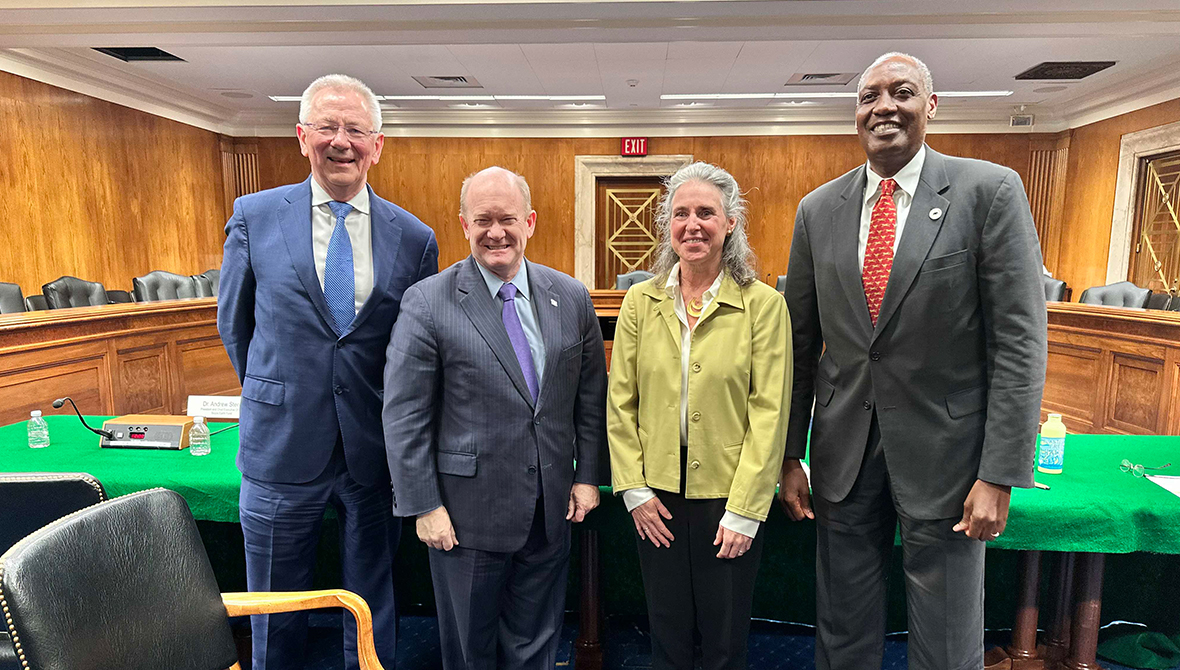AWF Testifies Before the US Senate Appropriations Subcommittee Hearing on International Conservation

Dr. Andrew Steer, Senator Chris Coons, Gillian Caldwell, and Kaddu Sebunya gathered for the Senate hearing
General Inquiries
Tel:+254 711 063 000
Ngong Road, Karen, P.O. Box 310
00502 Nairobi, Kenya

Dr. Andrew Steer, Senator Chris Coons, Gillian Caldwell, and Kaddu Sebunya gathered for the Senate hearing
African Wildlife Foundation CEO Kaddu Sebunya delivered both an oral and written testimony before the U.S. Senate Appropriations Subcommittee on State, Foreign Operations and Related Programs Hearing on International Conservation. The purpose of this hearing was to review strategies and gather insights to further U.S. support for international conservation.
The AWF CEO appeared before the Subcommittee chaired by U.S. Delaware Senator Chris Coons alongside two other witnesses: United States Agency for International Development Chief Climate Officer and Deputy Assistant Administrator, Ms. Gillian Caldwell, as well as Bezos Earth Fund President and Chief Executive Officer, Dr. Andrew Steer.
In his brief address to Congress, Mr. Sebunya reiterated the four priorities that came out of the Africa Protected Area Congress’ inaugural meeting last July: “Conservation characterized by isolated interventions parachuted in with well-meaning but externally driven motives is insufficient and counterproductive. In Africa, conservation must be people-centered and requires investment in solutions tied to local priorities and aspirations, addressing the complex realities and rapidly emerging conservation challenges facing the African continent and its leaders.”
AWF’s invitation to the Senate Hearing follows the organization’s participation in the second U.S.-Africa Leaders’ Summit (ALS) as a target to elevating conservation as a key pillar in U.S.-Africa partnership and fundamental to Africa's development. During the summit, the Biden administration emphasized their plans to invest $1.1 billion in "African-led efforts to support conservation, climate adaptation, and a just energy transition.”
The written statement, which intricately outlined AWF’s recommendations, highlighted the importance of locally-led conservation and stated that American support for balancing conservation and development on the continent is welcome and vital. However, for this support to be effective, it must be tied to African perspectives, priorities, and aspirations. It went on to explain that putting people at the center of effective and equitable conservation is a concept AWF has proven to live by through our more than 60 years of experience in conservation on the continent. This is why AWF recommends that U.S. support for international conservation must uplift Indigenous peoples, local communities, women, and youth, working in partnership with governments, civil society, and private actors to sustain the scientific and traditional knowledge and customary approaches that will result in effective conservation and the long-term resilience of nature, culture, livelihoods, and human well-being.
Regarding The U.S. Foundation for International Conservation Act, AWF believes the bill has the makings to be an influential wheel in the international conservation landscape. It has long been evident that government funding is insufficient to meet global conservation challenges and opportunities. Incentivizing and challenging philanthropy to match U.S. government financing to provide long-term, predictable funding for effective management of protected and conserved areas will be crucial in building the river of conservation financing to ensure that these strongholds of biodiversity continue to provide economic, environmental, social, and cultural benefits, locally and globally. The Foundation must be built on the premise that it prioritizes projects with the host-country government and local community support and creates economic opportunities.
>>Watch the recorded testimony and read more on the written testimonies